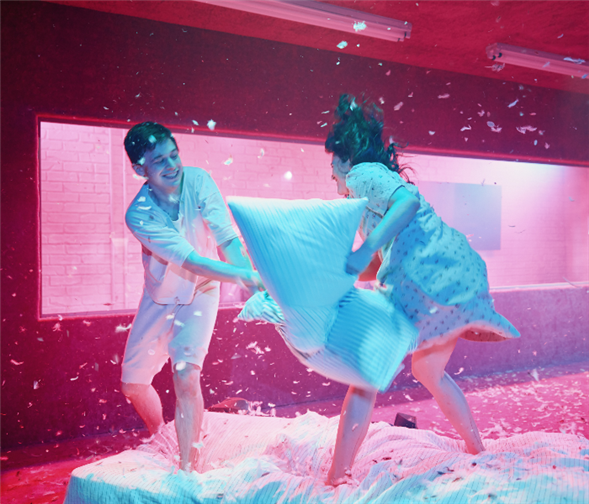Translate Page

Two new plays explore the intersection of first love and fascism
Rita Kalnejais' This Beautiful Future and Bess Wohl's Camp Siegfried both center teens experiencing first-love jitters against the backdrop of World War II. But these youths don't just fall for each other, they're also beguiled by Nazism. Talk about zeitgeist! In an era when extremism is rising, these new plays explore just how easily impressionable individuals can be ideologically seduced.
"I'm not sure I would call my play a love story," says Wohl with a laugh about Camp Siegfried, which premiered last year at London's Old Vic and begins previews at Off Broadway's Second Stage Theater on October 26 in a new production directed by Tony winner David Cromer. "It's about these two young people getting thrown together and how they combust. They're in some form of joint delusion, you know? A summer fever dream."
The play takes place in 1938 at Camp Siegfried, a real-life summer program on Long Island that was the American equivalent of Hitler Youth. During the pandemic, Wohl rented a house near the site and became intrigued. "Evil can exist in these incredibly benign-seeming places," she says. "It was really sort of chilling and compelling for me." Penning a play about this close-to-home history was a way to confront it. "There's such an erasure of the more pernicious, dark and unsettling parts of our past."
In Camp Siegfried, He (Johnny Berchtold) and She (Lily McInerny) engage in the splendors of the season—dancing, hiking, cookouts—with a side of indoctrination. Brimming with hormones, the teens are quietly encouraged to pair off and breed young Aryans. He and She fall into a hot-and-cold romance, and the transformation of the shy She into a confident, Sieg-Heiling camper happens as quickly as summer love.

"There's this sort of parallel in the play between young love and fascist ideology—both of them require absolute certainty," explains Wohl, whose previous plays include Small Mouth Sounds, Make Believe and the Tony-nominated Grand Horizons. "Like, are you sure you will feel this way forever? There's this sense of discovery, intensity and incredibly high stakes. And there's a lack of tolerance for questioning."
As He and She fantasize about a future together, they are ignorant of the horrors to come—this is before Kristallnacht, before the death camps. "The ultimate atrocities of the war are completely unimaginable to these characters," Wohl says. "I was interested in both a world on the brink and these people on the brink of adulthood."
For Rita Kalnejais, inspiration struck at a Parisian exhibition featuring footage of a young French woman getting her head shaved in front of a crowd. "It struck me that she probably had an affair with a Nazi soldier," recalls Kalnejais. "In her mind, she probably didn't think she did anything wrong. She just fell in love."
That was the jumping off point for This Beautiful Future, which had previous engagements in London and at NYC's Theaterlab, with the latter production transferring to Off Broadway's Cherry Lane Theatre where it runs through October 23.
The play follows Elodie (Francesca Carpanini), a 17-year-old French girl who gets involved with Otto (Uly Schlesinger), a 16-year-old German soldier during the Nazi occupation. It takes place over the course of one evening in Chartres, France, just hours before the Allies land in Normandy on June 6, 1944. The teens meet in the attic of a house that belonged to a Jewish family, and they coyly circle a mattress on the floor during their will-they-or-won't-they foreplay.
"I wanted to challenge myself to love more and to try to find humanity in the most easy-to-vilify place," says Kalnejais. For research, she listened to recordings of former Nazi Youth members recalling their experiences. "They can be kind and appalling and surprising and adorable."
Elodie and Otto are all those things. They channel their bubbling lustfulness through a feather-filled pillow fight and a childish game pretending to be cats. They share tender kisses and talk about a future together. First love "is so revolutionary, and when you're experiencing it, it's like it has never happened before," says Kalnejais.
Those moments of levity, though, are interrupted by harrowing speeches about "Mr. Hitler," the sounds of planes overhead and the sputters of bombs in the distance. Elodie is caught in a state of limerence and is not fully aware of what's happening outside the attic walls. She even believes the Jewish family will safely return home.
This Beautiful Future has been met with contention. For some audiences, the balance of first-love magic and anti-Semitism is dangerously disproportionate, an inappropriate exercise in humanizing evil.
While Kalnejais understands the criticisms, she explains that part of her creative process is to "slip into a place where I'm not making moral judgments so that I can write from character and see the world through their eyes." She admits, however, that "I always reach the limits of my understanding and my empathy. I could never write a play that was dogmatic—I'm just asking questions of myself."
Wohl also wants the freedom to explore thorny issues. "I think that our culture is veering very dangerously into this world where everyone has to have all the answers to everything, and there's no opportunity for any kind of uncertainty or nuance or doubt," she says. "Those things are essential to democracy and to conversation and to building a compassionate culture."
---
Allison Considine is a digital editor at MasterClass. Follow her at @theatric_ally. Follow TDF at @TDFNYC.
TDF MEMBERS: At press time, discount tickets were available for This Beautiful Future and Camp Siegfried. Go here to browse our latest discounts for dance, theatre and concerts.
Top image: Uly Schlesinger and Francesca Carpanini in This Beautiful Future. Photo by Emilio Madrid.